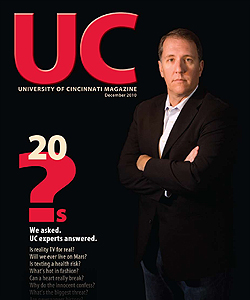Advertising
Do modern American consumers tend to lap up just about anything ad execs choose to spoon-feed us?
That's one way to explain millions of Snuggies sold.
Despite the fact that certain TV ads have surprising success, our expert tells us that a fraying economy and fractured media has forced marketers to work much harder to get our attention, particularly if they want us to turn out our pockets.
"Here in the USA, we have been a materialistic culture for a long time," says Chris Allen, professor of marketing in the College of Business. "Interestingly, though, the economic downturn has made people rethink that. We are in a period where consumers are acting differently than they did 10 years ago. They are much more conservative consumers."
Successful campaigns these days, the professor says, are those that are either value-oriented (think $5 footlong) or those that find creative ways to rise above the streams of clutter.
Where Mr. Whipple was once able to move toilet paper with his "Don't squeeze the Charmin" TV spot, P&G now stages an extravagant holiday gift to New York City — the annual Charmin-sponsored "Enjoy the Go" luxury public restrooms on Times Square. By creating an outlandish bathroom experience in the unlikeliest of places, P&G has gained an incredible amount of free publicity — from the "Today" show to "The Tonight Show."

"You stage these big events in high-profile places, bring in celebrities and get the media talking about you," Allen says. "It seems to be all about synergy and building buzz. And in the current environment, the buzz is online, and marketers are able to track it like never before."
The professor points out that successful ads are those that get uploaded to YouTube and shared widely on Facebook, essentially doing a marketer's job for him.
So, are we slaves to advertising?
Allen says that advertisers are more likely a reflection of culture rather than the grand puppeteers. But he doesn't doubt some influence.
"If you took advertising in the aggregate as a phenomenon and all the messaging that encourages consumption, supported by billions and billions of marketing dollars, there is certainly something that advances the consumerist or entitlement mindset," he says. "But that's the ocean we live in, right?
"We can't drain it, because then the economy really goes to pot. But we are sub-ject to that influence. It's a lofty question."
Link:
More about professor and advertising textbook author Chris Allen

 Issue Archive
Issue Archive